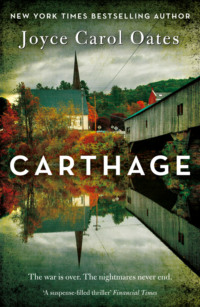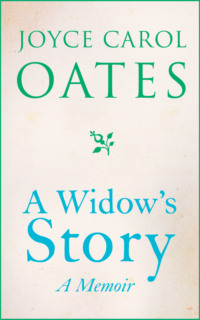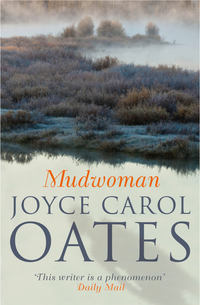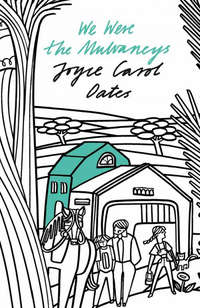
Полная версия
Little Bird of Heaven
Zoe’s pert question—“What can I do you for, sweetie?”—was like a riddle for there was something wrong with it, words were scrambled, you had to think—and blink—and think hard to figure out what was wrong.
Do you for. Not Do for you. This was so funny!
Even Ben, who disliked being teased, especially by people he didn’t know well, laughed when Zoe Kruller leaned on her elbows to peer down at him over the counter asking what could she Do him for and calling him Daddy’s big boy.
Well, if Mommy had brought us, Zoe would call Ben Mommy’s big boy. But it wasn’t so thrilling somehow, then: Zoe wouldn’t pay much attention to us, then.
Our mother knew Zoe Kruller when she’d had a different last name. When she’d been a high school girl, the younger sister of a classmate of Lucille Bauer’s at Sparta High.
In a small city like Sparta, everyone knows everyone else. It’s a matter of age, generation. Everyone knows everyone’s family background, to a degree. There are commingled histories, intense friendships and intense feuds that, having gone underground decades before, continue to smolder and pollute the air.
You can smell the pollution, but you can’t see it. You could not ever guess its history.
Tangled roots, beneath the surface of the earth. How astonishing to discover these roots, so hidden. How my mother began working obsessively outdoors that spring, digging in the clayey soil beside the driveway determined to plant what she called snow-on-the-mountains—a hardy fast-growing perennial—and the shovel struck a tangle of roots like something ugly knotted in the brain.
When the trouble began in my parents’ lives—except Ben and I had not known that there was anything like the trouble, at the start—our mother became strange to us, spending time outdoors as she’d never done in the past, sweaty and her forearms ropey-veined in a way frightening to see, and the set of her mouth grim like something zipped-up seen from the wrong side. And Mom would try to sink the shovel into the ground, using her weight as leverage, and the sole of her sneakered foot struck hard against the rim of the shovel and she cried out in pain Oh God! God-damn.
Beneath, those tangled roots. Severed, their insides glared a terrible white like bone marrow.
However our mother knew Zoe Kruller who was so glamorous at Honeystone’s, our father knew Zoe Kruller some other way.
Say I was on comfortable speaking terms with my brother Ben—from whom I am not estranged, exactly—and I called him impulsively and asked Do you remember us going to Honeystone’s? When Daddy took us? How different was that, from when Mom took us?
And say Ben didn’t hang up the phone. But in a mood of not-bitter reminiscence he would speak sincerely to me, thoughtfully. He would say:
Sure, you could tell. For sure.
At the time?
No. Not at the time.
But later?
Right. Later.
That quickness in Daddy. Playing the car radio loud, humming loudly with it. Driving just a little too fast on Huron Pike Road and the careful way he parked in Honeystone’s graveled lot, very likely it was one of Eddy Diehl’s showy cars he was driving, that very morning washing, waxing, polishing in our driveway and here in Honeystone’s graveled parking lot Eddy Diehl was positioning the car in such a way that, if anyone inside cared to glance out—Honeystone’s front window was horizontal, long, plate-glass spanning nearly the width of the building—she would see the stately 1973 Lincoln Continental with two-tone beige-and-black finish, or maybe it was the cream-colored 1977 Oldsmobile Deluxe with its glittering chrome grille—possibly the cherry-red vintage Thunderbird like the sleekest of rockets yearning to be launched—and she would stop dead in her tracks, and stare. And smile.
Eddy Diehl’s specialty-autos were to make observers smile.
Certain observers, that is. Others, the intention was to intimidate, provoke envy.
Jesus! Who owns that?
Seeing this vehicle in the lot, guessing the driver was probably Eddy Diehl, quickly she would turn away to check her reflection in the mirror at her back, or in the mirror of the little plastic compact she kept in a pocket of her white cord smock for just such semi-emergency occasions; there was just time for her to dab some scented ivory powder on her nose, check her eye makeup, shape a pouting smile to see if the crimson lipstick was still fresh. And adjust her hair in the damned hairnet they made you wear in this damned prissy place.
“Well say, Eddy Diehl! Thought it was you.”
Zoe Kruller’s sexy-throaty voice that was like sandpaper rubbed against sandpaper to make you shiver. Zoe Kruller’s voice that was close and warm and teasing like a voice murmured in your ear as you lay in bed, head on your pillow and bedclothes clutched to your chin.
With what eagerness Daddy entered Honeystone’s—pushing the door open with such force that the little bell attached overhead tinkled loudly, ushering his young children—what were their names—Ben? Krissie?—into the milky-cool, marble-cool air of Honeystone’s Dairy which was so wonderful.
And there in that instant was Zoe Kruller catching sight of Eddy Diehl, and Eddy Diehl catching sight of Zoe Kruller. Almost, you could feel the rush of blood that ran through them, like an electric current.
“How’re you doing, Zoe-y. Looking good.”
In a casual voice my father called out a greeting. Sunday afternoons, Honeystone’s was likely to be busy.
Zoe Kruller was such a favorite at the dairy, as she was a favorite at Chautauqua Park on summer-music nights, there were customers who waited in line to be waited on by her: though heavyset Audrey and white-haired Mrs. Honeystone might both be available behind the counter, scowling.
Not wanting to meet Mrs. Honeystone’s eye—the white-haired older woman was Marv Honeystone’s wife, and Eddy knew Marv Honeystone from having worked for him—Eddy lingered before one of the refrigerated dessert cases, hands on his hips, brooding. As if he’d come to Honeystone’s with the intention of buying a strawberry whipped-cream pie, a chocolate mousse, a three-tiered birthday cake, a luscious glazed fruit tart or a platter of fudge, chocolate-chip cookies, macaroons. “O.K. Ben, Krissie—say what looks good to you. What’d you like best.”
Earnestly Ben and I debated: the strawberry whipped-cream pie, banana cream pie, cherry pie with strips of golden crust like a pinwheel instead of the usual boring solid upper crust…
An entire display case of birthday cakes!
This debate could occupy minutes. While Eddy Diehl glanced at Zoe Kruller in the mirror behind the display case, took in his own reflection with a critical frown and slicked back his tufted rust-red hair like a rooster’s comb with a quick movement of both his hands.
Eddy Diehl’s big carpenter’s hands. Eddy Diehl’s big thumbs. Eddy Diehl’s heavy-lidded eyes behind flat sea-green “aviator” sunglasses with the metallic rims. Eddy Diehl’s wordless appeal to the pert petite strawberry-blond woman with the glamorous made-up face like a Dolly Parton doll, white sleeves pushed back to bare her pale freckled forearms.
After some Sundays of this, Ben began to object: “You always ask us what we want, Dad, but you never buy anything. So why ask us?”
I didn’t want to hear this. I’d made my choices to tell Daddy: banana cream pie, caramel custard pie, triple-layer chocolate cake with HAPPY BIRTHDAY scrolled in pink frosting on the top. Once I’d watched Zoe Kruller squirting a coil of pink frosting like toothpaste over a duplicate of this very cake, completing the message HAPPY BIRTHDAY ROBIN!
At the time, I’d thought how lucky Robin was.
Whoever Robin was: girl, boy.
Daddy said, just this side of annoyed: “Might be I’m making a mental note, Ben. Your Daddy has a mind like a steel trap. Filing facts, that will one day come in handy.”
Mental note? I was curious about this. Asked Daddy what was a mental note but Daddy was casting a sidelong look over at Zoe Kruller who was casting a sidelong smile at him past a customer’s frizz-permed head.
“Daddy? What’s a ‘mental note’—”
“You tell her, Zoe.” Affably Daddy raised his voice, to draw Zoe into the conversation. A few feet away Zoe was preparing sundaes for a family of fretting young children. “What’s a ‘mental note.’”
This presumed that Zoe had been listening to us from a distance of ten, twelve feet. That, since Eddy Diehl had first entered Honeystone’s, Zoe Kruller had been keenly aware of him and his two young children who took after the mother’s side of the family, it seemed—A gosh-darn pity since Eddy Diehl is the good-looking one and not chubby moon-faced Lucy Bauer.
Zoe tilted her head to indicate that she was thinking hard.
“‘Mental note’ is—a memory. You make a special memory inside your head, to remind yourself of something at a later date. ‘Mental note’ is for the future, to refer back to now.”
Zoe spoke in a low mysterious throaty murmur. I had no idea what she and my father were talking about but any succession of words Zoe Kruller spoke no matter how ordinary or banal were freighted with significance like words blazoned on a billboard or in a bright-lit TV commercial.
Eddy Diehl wore work caps, baseball caps. Always outdoors and often indoors. He’d removed his cap—grungy dark-blue with bronze letters SPARTA CONSTRUCTION, he’d worn for years—to swipe at his hair but he’d quickly replaced it tugging the rim low over his forehead. There was something shy about him, or anyway self-conscious: here was a man who knows he is looked-at by both women and men, and wants to be looked-at, yet on his own terms exclusively.
At work—at Sparta Construction, Inc.—Daddy wore white shirts: short-sleeved in summer, long-sleeved in winter. These shirts my mother ironed, for Daddy insisted upon white cotton shirts, not wash-and-wear. Daddy wore neatly pressed trousers on the job, sport coats or jackets in cold weather, never an overcoat. You would never see a carpenter—any man who works with his hands—wearing an overcoat on the job. Summers, away from work Daddy wore T-shirts and khaki pants likely to be rumpled and stained, running shoes on his size-twelve feet.
It never ceased to amaze me, Daddy was so big. Daddy loomed above me, a tall muscled man with broad shoulders, long arms and powerful wrists. In spite of his bad knee (as my mother called it, though not in Daddy’s presence) Daddy walked without wincing, or at least visibly wincing; never did he wish to allude to his bad knee, his injury; he flushed with indignation if anyone—usually female relatives of my mother’s—questioned him too pointedly about his health. (So too my father coolly disdained questions from relatives both male and female about how the construction business was going, smiling and shrugging Can’t complain. Holding our own. You?)
There was something loose and impulsive in my father’s movements, a quicksilver excitement hinting almost of threat except he was teasing, smiling—wasn’t he? Don’t come too close! Don’t mistake my seeming friendly for my being your friend.
On my father’s tanned arms thick hairs grew in bristling swirls and eddies, dark-rust-red shading to black, springy and intransigent as wires to the touch. As a little girl I’d been intimidated by Daddy’s muscled arms covered in hair and the hint of a dark wiry animal pelt covering his chest, parts of his back, beneath his white T-shirt, springing into view at his throat. Seeing the look in my face Daddy laughed: “Don’t worry, Puss. Turning into a mean hairy ape won’t happen to you.”
This was Daddy joking. I like to remember Daddy joking. It is important to remember that men like my father—so very American, small-city-coming-of-age-in-the-Vietnam War-era—were given to joking, teasing, what they called kidding around, there was nothing more wonderful than a man like Eddy Diehl in this mood, maybe he’s had a few beers, maybe he’s with his buddies, guys like himself who are the only people he can trust since he can’t trust any woman even his wife, not even his mother—If you have to ask why, forget it.
If you have to ask, go to hell.
Go fuck yourself, see? If you have to ask.
Nothing more wonderful than the smiles of these American daddies causing their hard faces to soften like boys’ faces and the edges of their wary eyes to crease and yet—nothing more frightening than when these daddies cease to smile.
Suddenly, and without warning.
As in Honeystone’s that day, when my father snapped at Ben: “Hey. Get the hell over here.”
What had Ben been doing? Poking at a platter of fresh-baked brownies covered in cellophane, displayed on one of the glass-topped cases.
Ben at the age of ten, a lanky sweet-faced boy with fair-coppery-redbrown hair in a silky swirl that made him look like a girl, startled fairbrown eyes, a rabbity unease. Daddy’s voice came much too harsh, furious for the occasion.
“God damn you what’re you doing. Keep your hands off what doesn’t belong to you.”
Daddy was getting pissed, as he’d say. Waiting for Zoe Kruller to pay attention to him. Waiting, and Eddy Diehl isn’t accustomed to waiting for women to pay attention to him.
I felt a shivery little frisson of satisfaction, that my older brother was being publicly scolded by our father. So funny—the way Ben jerked back from the display case as if he’d touched a snake. Yet it scared me, that Daddy might suddenly lapse into one of his moods, and little Krista would be scolded harshly, too.
But there came Zoe’s sweet-honeyed voice directed toward us at last.
“Eddy? That’s some swanky car out there.”
Daddy laughed, pleased. Daddy assented, yes that was his car, he’d acquired just a few days ago.
“Soon as you pulled into the lot, I knew it had to be you.”
Now words flew between our father and Zoe Kruller swift as Ping-Pong balls. Whatever these words meant—talk of Daddy’s newly acquired car, or Black River Breakdown’s next “gig” in a week or two—talk of respective spouses, families—on their surface these words were innocuous and banal like the smiles of adults as they gaze at you thinking their own faraway private thoughts.
Zoe was teasing but beneath you could see that Zoe was dead-serious.
Fixing Eddy Diehl with her crazed-amber eyes, calculating and ardent; stroking her bared forearm that was freckled and stippled with tiny moles.
I saw how Zoe Kruller’s fingernails flashed crimson. I saw how Daddy would see, and felt my blood quicken.
After what seemed like a long time—though it must have been no more than two or three minutes—Zoe turned her wide-eyed gaze upon Ben and me: “So—Ben? And—Krissie? Daddy’s little guy, and Daddy’s little gal—what can I do you for today?”
We laughed, this was so curious a way of speaking, like a riddle, like tickling. I wasn’t sure that I liked it, words scrambled in such a way. As a little child I’d been anxious about misspeaking, and provoking adult laughter. Saying words in the wrong sequence like wetting my panties, wetting the bed, spilling a glass of milk at supper, dropping a fork laden with mashed potatoes, what a child most dreads is the exasperated laughter of adults when you have done a wrong thing.
Now Zoe Kruller was mouthing funny words Do you for. What can I. Ben? Krissie?
I loved Zoe Kruller, I think. The way Zoe Kruller fixed her eyes on me, and called me by name.
Why was I so frightened of Zoe Kruller!
There was an interlude of teasing-Krissie—Daddy told Zoe that I wanted a coffee ice-cream cone—I protested no, I hated coffee ice cream—and Zoe laughed and said yes, she knew: what I wanted was a doublescoop cone, chocolate on the bottom and strawberry on top.
“Your daddy’s a tease, sweetie. Don’t think I pay your damn ol’ daddy much mind.”
Damn was one of those words adults could use. Depending on the tone and on who was saying it to whom it was soft-sounding as a caress, or it was harsh.
Anything that passed between Zoe Kruller and Eddy Diehl, in Honeystone’s Dairy, was soft-sounding as a caress, and not harsh.
Daddy never bought ice-cream cones or sundaes for himself. Not ever. Daddy hadn’t much taste for sweet things, preferred salty things like pretzels, peanuts, potato chips however stale, eating them by the mouthful as he drank beer, Sundays. And Daddy liked coffee, Daddy was “hooked” on black coffee, so pungent-smelling it made my nostrils shut up, tight. Especially Daddy liked coffee you could get at Honeystone’s which smelled like a different kind of coffee than at home.
Zoe made a show of pouring the steaming liquid into a tall Styrofoam cup. “There you go, Eddy. Hope it’s what you like.”
“Yes. It’s what I like.”
One day, Zoe Kruller would be vanished from Honeystone’s. One day soon and it would be a shock to me, a cruel surprise—my mother was the one to drive Ben and me to the dairy and eagerly we’d run inside looking for Zoe Kruller but there was just old Mrs. Honeystone and fat scowling Audrey and another girl who was a stranger to us and we asked Mrs. Honeystone where was Zoe? Where was Zoe? and Mrs. Honeystone said only that she’d quit, Mrs. Honeystone did not utter the name Zoe but only just she. You could see how Mrs. Honeystone would not smile and did not care to say anything further about Zoe Kruller nor would our mother inquire.
Where is she, she’s gone. Gave notice, and gone.
THAT DAY, that Sunday I am thinking of. When I was eight years old and going into third grade in the fall. And Daddy and Zoe Kruller talked together in their swift Ping-Pong banter as Zoe scooped out ice cream for Ben and me and poured coffee for Daddy, rang up the order and made change and Daddy said in a lowered voice taking the change from Zoe’s slender fingers with the startling crimson nails that Zoe should say hello to Del for him—someone named “Del”—and Zoe laughed and said, “Sure! When I see him.” Which was an answer that possibly took Daddy by surprise, he fumbled the change, dropped a quarter that rolled across the marble-tile floor and Ben swooped to snatch it up; and Zoe said, still with that laugh in her voice like nothing could hurt her, airy and light as any little bird fluttering overhead, “And you say hi to Lucy, will you?”
Outside in the parking lot, in muggy-hot air, oppressive after the milky cool of the dairy, as we approached Daddy’s car parked imprudently in the glaring sun, discovered that the tip of my ice-cream cone was caved in, broken—and then I discovered, horribly, that something was inside the tip of the cone: squirmy black weevils.
I screamed. I dropped the cone onto the ground.
Daddy heard, and came to investigate.
“What the hell, Krissie? What’s wrong?”
Two scoops of ice cream—strawberry, chocolate—on the hot gravel, melting. Looking so silly, there on the ground. Something that was meant to be a treat—something special, delicious—on the ground like garbage. I told Daddy that there were weevils inside the cone, I couldn’t eat it. I was gagging, close to vomiting. Daddy cursed under his breath poking at the cone with the tip of his shoe, as if he could see from his height the half-dozen black insects squirming inside the tip; his manner was skeptical, impatient; he didn’t seem very sympathetic, as if the defiled cone was my fault. Or maybe, a clumsy child, I’d simply dropped it, and was trying to pass on the blame to someone else.
“Well. You’re not getting another one, we’re late and we’re leaving.”
Not another cone? When this wasn’t my fault? I drew breath to protest, to cry, stricken with a child’s sense of injustice, and with the loss of something I’d so craved, but Daddy was heedless, Daddy had made up his mind he wasn’t going back inside the dairy, he wasn’t going to complain to Zoe Kruller or to anyone about his daughter’s ice-cream cone.
When I balked at leaving Daddy took my arm roughly, my thin bare arm, at the elbow, and gave me the kind of tug you don’t resist. “Fuck it Krista, I said come on.”
Ben, smirking, licking his ice-cream cone, showed little sympathy, too. In the front seat of the car beside Daddy where, being a boy, he insisted upon sitting. In the backseat riding home—the car was an Oldsmobile, I think—some kind of special “Deluxe” model—mauve interior—the leather seat hot from the sun, searing my bare legs—I was whimpering, crying under my breath stunned with the unfairness of what had just happened, if I’d run back inside the dairy of course Zoe Kruller would have given me another ice-cream cone, if Mommy and not Daddy had brought me that day, of course Mommy would have seen to it that I’d gotten another ice-cream cone, inside Honeystone’s the clerks would have been sympathetic, apologetic. But Daddy was driving away, and Daddy was flushed with anger. Daddy was cursing beneath his breath, you wouldn’t want to annoy him. If he’d thought of it, Daddy would have ordered Ben to share his ice-cream cone with me but Daddy wasn’t thinking about any ice-cream cone, or about his stricken daughter, his thoughts were elsewhere. I huddled in the backseat sniffing and panting thinking Not my fault. Not my fault. Why is Daddy mad at me! My eight-year-old heart was broken, it would not be for the first time.
A week or so later when we were taken to Honeystone’s by our mother, on our way home from visiting one of Mommy’s cousins outside East Sparta, Ben was eager for an ice-cream cone but I was not. Instead, I asked for a sundae, in small plastic bowl where you could see what you were eating. Though Zoe Kruller was at the counter, and remembered exactly the kind of ice-cream cone I’d always wanted, winked and called me “Krissie” in the sweetest way, and tried to get me to smile at her, I wouldn’t smile, I was sulky-sullen and not the sweet little Daddy’s girl and I would not lift my eyes to Zoe’s shining face, I would not.
8
TWO YEARS, seven months later on a snow-glaring Sunday morning in February 1983 Zoe Kruller was found dead in a brownstone rental on West Ferry Street, downtown Sparta.
On the front page of the Sparta Journal it was reported that Zoe Kruller had suffered blunt force trauma to the head as well as manual strangulation and so it was a case of foul play, homicide.
It was revealed that the murdered woman had been separated from her husband, no longer living with her family. It was revealed that the murdered woman had been discovered in her bed, by—
“Krista. Give that to me.”
“No! I’m reading this.”
“I said—”
She snatched the pages from me. Such agitation in her face, I surrendered the pages to prevent their being torn.
Such agitation in her face, I turned away frightened. But I’d seen—
Discovered in her bed by her fourteen-year-old son Aaron Kruller who ran into the street to summon help.
At this time, I was eleven years old. No longer a small child to be protected from what my mother called “ugly”—“nasty”—“disgusting” things. No longer a small child to tolerate such protection and so somehow I knew—I came to know—that the glamorous freckled friendly woman who’d waited on us at Honeystone’s was this very woman who’d been found strangled in her bed by her own son; I came to know, with a thrill of horror, and of fascination, that at the time of her death Zoe Kruller had not been living with her family, as other wives and mothers lived with their families; at the time of her death Zoe Kruller had been separated from, estranged from her husband Delray Kruller and her son Aaron who was in my brother Ben’s class at the middle school: separated from, estranged from, broken off communication with. Such delicious facts I came to know, that caused a sensation of numbness to pump through me, as if I were wading into a dream; a dream that resembled the Novocain injected into my tender gums, when I went to the dentist; a dream that left me short of breath, dazed and strangely aroused, headachey; a dream of the most intense yearning, and the most intense revulsion. For to these facts were added, in what was invariably an altered tone of voice, like the shifting of a radio station on the verge of dissolving into static, the fact that Zoe Kruller was sharing quarters with another woman, at 349 West Ferry.







